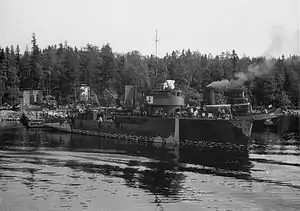Ruotsinsalmi-class minelayer
The Ruotsinsalmi-class minelayers were a two-strong class of minelayers in the Finnish Navy. The two ships, comprising Ruotsinsalmi and Riilahti, were constructed in Finland and saw service in the Winter War and World War II. Riihahti was sunk in an engagement with Soviet motor torpedo boats on 23 August 1943. Ruotsinsalmi survived the wars and remained in service in the post war Finnish Navy until being withdrawn in the 1970s.[lower-alpha 1]
 Riilahti | |
| Class overview | |
|---|---|
| Name | Ruotsinsalmi class |
| Builders | Crichton-Vulcan, Turku |
| Operators | |
| Succeeded by | Keihässalmi |
| In service | 1941–1975 |
| Completed | 2 |
| Lost | 1 |
| Retired | 1 |
| General characteristics | |
| Type | Minelayer |
| Displacement | 310 t (310 long tons) |
| Length | 50 m (164 ft 1 in) |
| Beam | 7.9 m (25 ft 11 in) |
| Draught | 1.5 m (4 ft 11 in) |
| Propulsion | 2 × Rateau diesel, 2 props, 890 kW (1,200 bhp) |
| Speed | 15 knots (28 km/h; 17 mph) |
| Complement | 60 |
| Armament |
|
Design and description
By the late-1930s, the Finnish Navy was focused on defence of the nation and the only ships under construction by Finland were the Ruotsinsalmi-class minelayers and assorted smaller craft. This was due to the majority of the defence budget being awarded to the Finnish Army.[4] The Ruotsinsalmis measured 50 metres (164 ft 1 in) long overall with a beam of 7.9 m (25 ft 11 in) and a draught of 1.5 m (4 ft 11 in). They had a standard displacement of 310 tonnes (310 long tons).[3][lower-alpha 2] The vessels were powered by two Rateau diesel engines turning two shafts creating 890 kilowatts (1,200 bhp) and giving the minelayers a maximum speed of 15 knots (28 km/h; 17 mph). They had a complement of 60.[6]
The ships were armed with one 50-calibre 75-millimetre (3.0 in) guns, two Madsen 20 mm (0.79 in) anti-aircraft cannon for anti-aircraft warfare. The vessels were also equipped with mine dropping rails, and could carry about 100 mines. Though not designed for anti-submarine warfare, the Ruotsinsalmi-class ships mounted two depth charge racks and two throwers.[3]
Vessels of the class
| Ruotsinsalmi class construction data[3][6] | |||||
|---|---|---|---|---|---|
| Ship name | Builder | Laid down | Launched | Commissioned | Fate |
| Ruotsinsalmi | Crichton-Vulcan, Turku | 1938 | May 1940 | February 1941 | Deleted 1977 |
| Riilahti | 1940 | 1941 | Torpedoed and sunk, 23 August 1943 | ||
Construction and career
Both Riilahti and sister ship Ruotsinsalmi were laid down in 1938, launched in 1940 and completed in 1941.[3] The minelayers were active in the Winter War and again in World War II both times engaged with the Soviet Union.[7] In July 1943, Soviet forces attempted a breakout into the Baltic Sea from where the Finns had them blockaded via the Seeigel-Rukajärvi mine barrage. There were a number of naval encounters in the Soviet attempt and Riihahti was sunk on 23 August 1943 in a battle with Soviet motor torpedo boats.[8][lower-alpha 3] Ruotsinsalmi survived the war and remained in the Finnish Navy even after the terms of the Paris Peace Treaty of 1947 that was signed following the end of World War II restricted the navy's operational capacities.[9] In the post war era, Ruotsinsalmi was rearmed with two 40 mm (1.6 in) guns and two 20 mm guns while retaining her minelaying capability.[5][6] Moore[1] and Westerlund & Chumbley[2] claim the vessel was deleted in 1975 and Westerlund[3] states the vessel was stricken in 1977.
Notes
- Moore[1] and Westerlund & Chumbley[2] claim the vessel was deleted in 1975 and Chesneau[3] states the vessel was stricken in 1977.
- Couhat[5] has the standard displacement as 270 t (270 long tons) and the full load displacement at 310 tonnes.
- Westerlund states that Riihahti was torpedoed by a submarine.[3]
Citations
- Moore 1976, p. 141.
- Westerlund & Chumbley 1995, p. 91.
- Westerlund 1980, p. 365.
- Westerlund 1980, p. 363.
- Couhat 1976, p. 73.
- Blackman 1969, p. 87.
- Westerlund 1980, p. 364.
- Rohwer 2005, pp. 224–225.
- Blackman 1969, p. 86.
References
- Blackman, Raymond V. B., ed. (1969). Jane's Fighting Ships 1969–70. New York: McGraw-Hill Book Company. OCLC 30910135.
- Couhat, Jean Labayle, ed. (1976). Combat Fleets of the World 1976/77: Their Ships, Aircraft, and Armament. Annapolis, Maryland: Naval Institute Press. ISBN 0-87021-183-8.
- Moore, John, ed. (1976). Jane's Fighting Ships 1976–77 (79th ed.). New York: Franklin Watts Incorporated. ISBN 0-531-03261-2.
- Rohwer, Jürgen (2005). Chronology of the War at Sea 1939–1945: The Naval History of World War Two (Revised & Expanded ed.). Annapolis, Maryland: Naval Institute Press. ISBN 1-59114-119-2.
- Westerlund, Karl-Erik (1980). "Finland". In Chesneau, Roger (ed.). Conway's All the World's Fighting Ships 1922–1946. Greenwich, UK: Conway Maritime Press. pp. 363–367. ISBN 0-85177-146-7.
- Westerlund, Karl-Erik & Chumbley, Stephen C. (1995). "Finland". In Gardiner, Robert; Chumbley, Stephen & Budzbon, Przemysław (eds.). Conway's All the World's Fighting Ships 1947–1995. Annapolis, Maryland: Naval Institute Press. pp. 91–94. ISBN 1-55750-132-7.